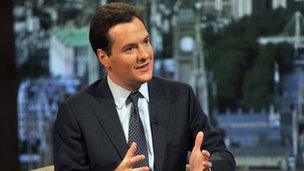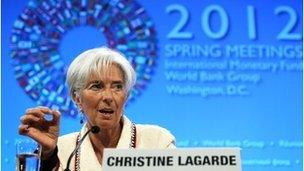Chancellor wants charity talks over donor tax changes
- Published

The Chancellor admitted critical newspaper headlines had not been helpful
Chancellor George Osborne says he wants to work with charities and donors to find a way to protect their income after tax changes in the Budget.
It is feared that plans to limit tax relief could result in a drop in donations from wealthy benefactors.
"I want to sit down with the charities, get it right and make sure they get protected," he told the BBC.
He also defended his decision to go ahead with a £10bn loan to the International Monetary Fund.
On the charities issue, he told Radio 4's Today programme: "I think the principle that however rich you are, you pay income tax is protected."
Mr Osborne admitted the Budget proposal had caused "a rush of headlines", but said it was never the plan that anything should be rushed in, and he had always been planning to have a period of consultation.
"I announced in the budget the principle - I didn't actually publish a load of detailed legislation and ask Parliament to vote on it immediately," he told the Today programme.
"I said 'Let's take 12 months to get this right. I know in the first few weeks it's caused a rush of headlines but good tax making takes time and that's what I want to do."
Having come in for particularly fierce criticism over the 'pasty tax' row about VAT on certain types of hot takeaway food, and a freeze on age-related allowances, the Chancellor also admitted the presentation of what he was trying to achieve in the Budget had been problematic - but stood by the decisions that he had taken.
"I'm the first to accept the headlines have not been great, and I think the fact bits of it were leaked in advance didn't help with presentation," he said.
"But ultimately, doing my job, you have to keep your eye on the most important thing - are you doing the right thing to help the British economy create jobs and grow?
"I think the decisions we took in the Budget, to make the tax system more competitive and to help business grow, were the right decisions and are the right decisions.

IMF managing director Christine Lagarde can now call upon a new loan of £10bn from Great Britain
"I think the Budget made a significant contribution to making Britain a better place to do business."
The chancellor also defended his decision to lend £10bn to the International Monetary Fund, saying it was in Britain's interest to keep the global economy as healthy as possible.
"Britain has a massive interest in a stable world economy and institutions like IMF help ensure that stability - if you don't have that you lose jobs in Britain and the British economy suffers," he said.
He rejected the idea that the money was specifically earmarked to prop up the euro, and said the money was not at risk.
"We're very clear our money comes with conditions - first, it's a loan which comes with interest and gets paid back and no-one has ever lost money lending money to the IMF," he said.
"It's not a special fund of the euro - I'm not pretending the eurozone doesn't have problems but in the end we've got to be, as Britain, people who believe in strong international institutions like the IMF which, more than 60 years ago Britain conceived and had the idea of."